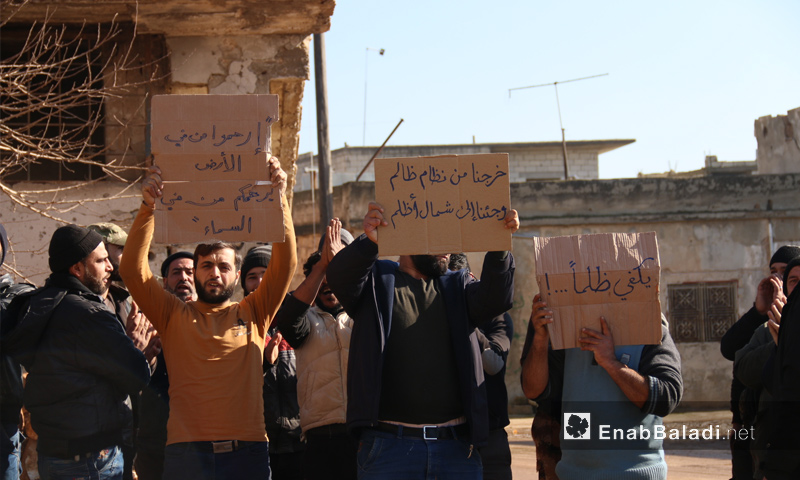“No rent, no rent; God has given us this house!” This is the expression which demonstrators shouted in the two towns of al-Fu’ah and Kafriya, northern rural Idlib, which witnessed protests in the last week of 2018 against what the protestors called the practices of the military factions, in an indication to the imposition of monthly rents on houses and shops.
The two towns are a house to dozens of families, displaced from the rural parts of Damascus, Homs and its countryside, Daraa, Quneitra and others, who are inhabiting the area instead of the original population, which left the area due to a deal between the military factions on the one side and Iran and the Syrian regime on the other.
The opposition factions took over the two towns of al-Fu’ah and Kafriya last July under a deal with Iran, called the “Five Cities” deal, which covered the areas of Wadi Barada, the two towns and an exchange of detainees.
The displaced people settled down in the area and renovated the houses at their expense, but the military factions have been lately demanding monthly rents for the houses and the shops, the only source of living for many of the families.
“After the factions controlled the area, we came to settle down in the towns given the permission of the al-Sham Legion. Upon receiving the houses, they were poorly furnished; they had no doors or windows, in addition to lacking services,” Jamal Twaim, one of the people displaced from the city of Darayya to Northern Syria, told Enab Baladi.
The families, which headed to al-Fu’ah and Kafriya, were forced to renovate the houses according to available resources, as Twaim said, explaining that the factions are demanding that people pay a monthly rent of a thousand Syrian pound for each house and that formal contracts be signed by the factions and the displaced people in the upcoming months.
Enab Baladi tried to contact the faction as to address the issue, but it received no answer.
Daily life turned the area into a new community for the displaced people, who opened shops and restaurants only to confront with the faction which asked for five thousand Syrian pounds as a monthly rent for shops.
A number of the people using the shops paid the required amount while others refused according to Twaim, who said that in case the factions are unable to provide us with the basic life needs, “[let them] take us back to our destroyed town to renovate our houses, for in the end this is not our home town.”
This is not the first time that the town of al-Fu’ah witnesses protests on the part of the displaced people, for this movements became a recurrent scene as a result of the practices of the factions in control of the area.
Last November, dozens of people, displaced from rural Homs and based in al-Fu’ah, went on the streets after they were ordered by the factions to evacuate the houses where they live.
Internally displaced people constitute a sufficient portion of the population of Northern Syria, and according to a census issued by the “Response Coordination Group” on December 26, 2018, the population of Northern Syria has gone beyond the mark of four million and 700 thousand persons, of whom a million and 600 thousand persons are forcibly displaced and escapees.
The organization, active in Northern Syria, has repeatedly called on the humanitarian organizations to contribute to covering the people’s needs of winter supplies, especially the most vulnerable segment, forcibly displaced persons who are living in inhabitable houses under the weakness of the humanitarian response operations in the area.











